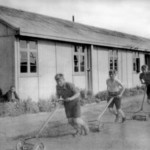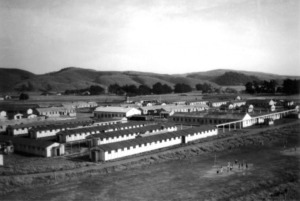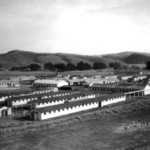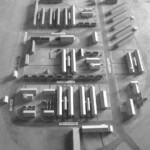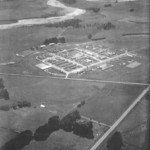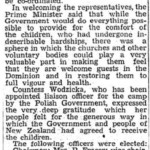Polish Refugees in New Zealand 1944-1951
Exhibitions
Camp Structure and Organisation
Krystyna Skwarko: The camp was run at the expense of the Ministry of Defence and was under its supervision. It was divided by tar-sealed streets into four main sections.
The first section contained the administrative building, then four dormitories for the boys, a canteen, a recreation hall for the army staff and a dining hall for the younger boys.
The second section had detached family cottages for the staff with families, a dormitory for the preschool children and another for the younger school boys. Further down there was a library, a large recreation hall with a small chapel (used on Sundays for church services), a gymnasium, a hospital and another dining hall for the older boys.
The third section contained the dormitories and a dining hall for the girls, and some more family cottages for the staff.
The school buildings were in the final section. This also contained a long building divided into separate rooms for the single staff, some huts for the army staff and a clothing store.
Altogether, it was a well-planned place. (p54)
… On either side of the corridors that linked the dormitories there were bathrooms, showers, toilets and wash-basins.
Each dormitory also had a separate room for the supervisor. (p56)
… On the one hand the camp was under the authority of the New Zealand Army, with Major Foxley as the Commandant and all the army administrative and domestic staff took orders from him. In parallel with this there was the Polish administration with Mr Sledzinski, the Polish Delegate, as its head. The Polish staff, including the school teachers, received their instructions from him.
The New Zealand Government assured the children and the staff a place to live and their keep for the duration of the war. On the other hand the Polish Government was to pay the salaries of the Polish staff and provide pocket money for the children. This was to be paid into their Post Office Savings Accounts.
Delegate Sledzinski represented two Polish ministries, the Ministry of Education and the Ministry of Social Welfare. His deputy, Mr F. Bala, was to look after the internal affairs of the camp, and Mr J. Holona became Inspector of Schools. Both were to co-operate with the rest of the staff to create the best possible conditions for the education and upbringing of the children.
It was intended that after the war all the children and staff were to return to Poland. But when the political situation of Poland unexpectedly deteriorated on the world scene we became more and more dependent on the Government and people of New Zealand. (p59)
… When the Polish authorities became aware that the cost of a small country like New Zealand of keeping such a number was enormous, Mr Sledzinski decided that we should try to lower the costs by taking over the work of the army staff. He directed the Polish staff to take over the running of the kitchens, the cultivation of the vegetable garden, and the laundry.
It was not very difficult because we still had the domestic staff who had come with us from Persia. As well as this there were some girls in the 16 to 18 age group who did not want to go on with their secondary schooling and gladly took jobs at the camp to earn some money.
In another move, Mr Sledzinski announced that none of the Polish staff was allowed to leave the camp in order to settle elsewhere but must remain in their positions and fulfil their obligations towards the children.
He asked the staff to teach the children to respect physical work and to organise duties for the older children to help in the kitchens and keep the camp tidy.
The staff accepted and carried out all these undeniably necessary instructions by Mr Sledzinski with understanding and cooperation. The army staff was withdrawn and the Polish took over the work.
The children did their duties outside the school hours. They cleaned the camp, they washed the dishes, they tidied their dormitories and washrooms and worked in the gardens.
Not only did the supervisors see to it that the duties were carried out but they set a good example by joining in the work to show the children how it should be done properly.
The children were proud of their work and happy to show off a tidy camp to any visitors. (p61)
… In July, 1945, we had a change of New Zealand command in the camp. Major Foxley retired and was replaced by a professional soldier, Major E. Finney.
A month later, at a meeting on August 16, Mr Sledzinski gave us some depressing news. He had received instructions from the Polish Social Welfare Office in London that every Polish settlement outside Poland had to become self-supporting. Our camp was to organise itself accordingly. (p69)
… September (* editor’s note ‘September 1945’) was marked by many changes in the camp’s personnel. Mrs Tietze became principal of the Girls’ Primary School and Mrs Surynt took charge of the preschool children.
Shortly afterwards Mr Sledzinski left his position at the camp and in his place the Polish Government in London appointed Mr S. Zaleski who was living in South Africa at that time. Until his arrival the camp was run by an Interim Committee elected at a general meeting of the camp’s staff. The three members of the committee were Father M. Wilniewczyc, Mrs S. Surynt and Mr R. Laszkiewiez.
It was about that time as well that after consulting the Polish Government the New Zealand Government drew more than 20,000 NZ pounds from the Bank of New Zealand. The money had earlier been sent by the Polish Government in London to its delegate in New Zealand. In return the New Zealand Government undertook to pay the staff salaries and children’s pocket money and to bear the cost of secondary and higher education of the children who had no parents. (p69-70)
… The Polish High School was closed in August 1946 and the students dispersed to convents throughout both islands. From the same date, Mr J. Bialostocki was placed in charge of the boys’ dormitories and in February, 1947, Mr S. Zaleski took charge of the Boys’ School, now reduced to half its original number. Mr McKinnon was appointed Inspector of Schools. (p73)
The Invited; p54, 56, 59, 60, 61, 69, 69-70, 73
Voices
Photos
